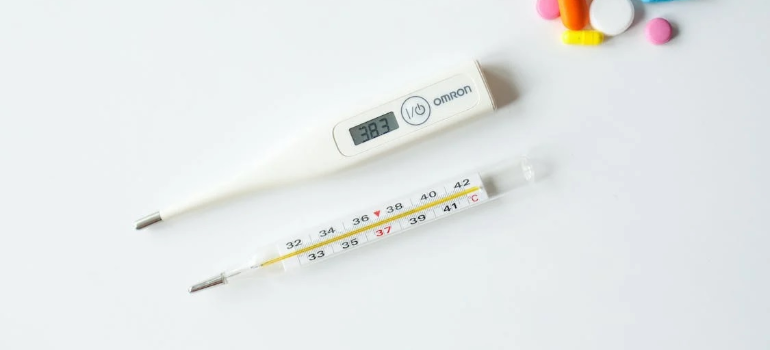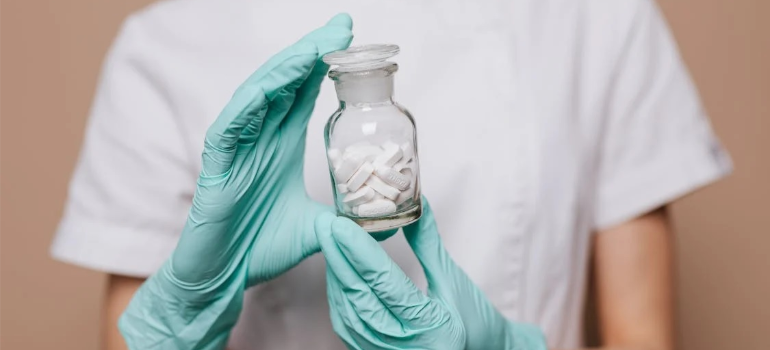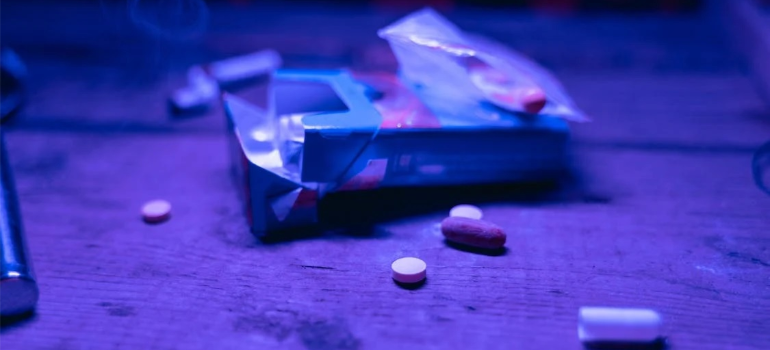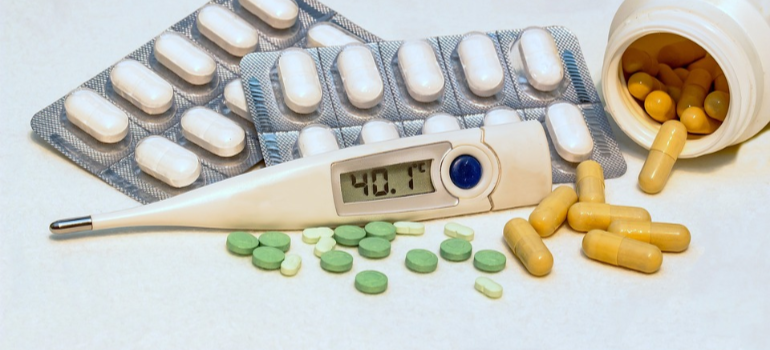Can You Get a Fever From Detoxing?
Get Help Now
Detoxing from any addictive substance can present many challenges. The impact on one’s mental health can be severe, as the process is taxing, and restoring behavioral health can delay. Managing stress and cravings and avoiding harmful triggers become necessary skills, and acquiring them can begin as early as during detox programs Florida treatment providers offer. Such symptoms aside, however, detox also comes with varying physical withdrawal symptoms. Ranging in severity from discomforting to potentially life-threatening, they need to be understood in advance and managed by professionals. Some among them are rarer than others, however, and often case-sensitive and substance-specific. For instance, our clients and acquaintances often ask if one can get a fever from detoxing. This is an excellent question that deserves some due exploration to answer.
What’s Considered a Fever?
Exact definitions of body temperature ranges for a fever vary, as normal body temperatures can differ due to different factors. Such factors can include exercise, menstrual cycles, time of day, and so on. Still, generally, a temperature of 99 to 99.5 F (37.2 to 37.5 C) typically qualifies as a fever.
Notably, there can be a difference between adults and children, as well as depending on means of measurement, as Cleveland Clinic finds:
- “For adults, a fever is when your temperature is higher than 100.4°F.”
- “For kids, a fever is when their temperature is higher than 100.4°F (measured rectally); 99.5°F (measured orally); or 99°F (measured under the arm).”
In addition to increased body temperature, a fever may also come with varying symptoms. These, and their severity, will depend on the cause and the individual, but can include:
- Weakness
- Appetite loss
- Shivering and sweating
- Headache
- Muscle ache
- Dehydration
A fever will typically occur in response to an infection, but not exclusively so. A few different illnesses may also cause one, including:
- Colds or flu
- Bronchitis
- Strep throat
- Urinary tract infections
- Mononucleosis
Finally, in the context of rehab, one can also get a fever from detoxing as a part of withdrawal symptoms.

What Is Detox?
The latter part of the question relates to the process of detoxification. At Archstone Recovery, we run some of the most extensive and thorough programs for medical detox Florida has to offer. As such, here we should explain exactly what detox entails.
The Phase Of Detoxification
As a term, detoxification refers to the recovery process as the body is deprived of toxic or addictive substances. The body’s typical response to detoxification is to attempt to maintain homeostasis, despite the absence of said substances. NCBI explains:
“The body aims to maintain homeostasis, and when a chemical that was once overused is removed, counter-regulatory mechanisms may produce unopposed effects, and withdrawal symptoms may ensue”.
Indeed, this phase comes with severe challenges, as withdrawal symptoms emerge while the body strives to self-regulate. Withdrawal symptoms vary considerably across cases and substances, but can include:
- Trembling and tremors
- Muscle ache
- Increase or loss of appetite
- Fatigue and exhaustion
- Sweating
- Irritability and agitation
- Depression and anxiety
- Nausea and vomiting
- Confusion and disorientation
- Insomnia
- Paranoia
- Seizures
In addition, the initial post-detox phase can include Post-Acute Withdrawal Syndrome (PAWS), with symptoms including:
- Irritability
- Foggy thinking
- Depression
- Anxiety
- Hostility
- Cravings
- Memory issues
- Mood swings
- Fatigue
- Inability to manage stress
- Insomnia or other sleep disturbances
- Limited focus
- Lack of initiative
It is thus arguably expected that one can get a fever from detoxing, as well. This notably challenging phase finds the body imbalanced, as it struggles to maintain equilibrium.

Medically-Assisted Treatment (MAT)
It is for this reason that “detox” tends to mean “detoxification program” in addiction treatment circles. For most professionals, enduring the detox phase on one’s own is nigh unthinkable, and very ill-advised. Therefore, “detox” is often synonymous, and sees interchangeable use, with Medically-Assisted Treatment (MAT).
MAT programs, as the name suggests, entail detox through pharmacotherapy and professional help and supervision. Such programs come in two forms:
- Inpatient detox. In most cases, detox programs take place in inpatient settings. Virtually every inpatient drug detox center Florida has to offer will recommend this option for all but the mildest cases. Inpatient detox programs take place in clinical settings, under consistent medical supervision, to ensure comfort and successful detoxification.
- Outpatient detox. Milder cases of addiction, particularly ones of brief, infrequent, or little substance use, may afford outpatient detox instead. This option allows the individual to reside at home, returning to a clinical facility to continue pharmacotherapy as needed. In this regard, outpatient detox programs are akin to a Partial Hospitalization Program (PHP).
As outlined above, the need for MAT and the choice between its forms will both depend on addiction severity. In either case, MAT is always perfectly safe and does not present risks of addiction transfer. Addiction treatment providers only use FDA-approved drugs for such programs, and continuously monitor patients to prevent such potential risks.

Home Detox
Unfortunately, quite a few individuals with SUDs still choose to not receive treatment and instead attempt to detox at home. This practice is, to reiterate, very dangerous and ill-advised. Not only can individuals get a fever from detoxing at home, but a lack of general treatment of symptoms can even prove fatal.
In brief, the main risks home detox entails are:
- A potential relapse. Before considering the physical and mental impact of withdrawal, home detox offers no effective way to manage cravings. Many individuals simply cannot endure the phase alone and unassisted, relapsing to their substance of choice. As such, dangers aside, home detox may simply fail in its purpose.
- Severe health complications. In addition, more severe withdrawal symptoms can lead to serious health complications. Such symptoms as depression can bring about thoughts of self-harm, and ones like seizures can even prove fatal.
- Depending on severity, death. Finally, truly severe symptoms can indeed prove fatal if untreated. A heavy toll on one’s mental health can lead to suicide, while physical symptoms can also exacerbate physical health problems.
For a notable example of fatal complications, we may present delirium tremens. This syndrome is most common in Alcohol Use Disorders (AUDs), and NCBI reports it can be fatal:
“[Delirium tremens] results in seizures and could progress to death if not recognized and treated promptly. The reported mortality rate for patients who experience delirium tremens is anywhere from 1 to 5%. […] Delirium tremens is fatal in nearly 15% of cases without treatment and 1% in those who do receive treatment”.
Drugs Used In Detox Programs
Since one can get a fever from detoxing, alongside other withdrawal symptoms and their own complications, treatment providers suggest pharmacotherapy. To combat withdrawal symptoms, manage cravings, and minimize risks, detox programs use FDA-approved drugs. Some are used to treat cravings and aches, while others can treat psychological effects like anxiety.
Detox Medications
Examples of the former include:
- Acamprosate (Campral); a medication that reacts with the patient’s neurotransmitters, this AUD-specific drug reduces the brain’s dependence on alcohol. At the moment, it is one of three FDA-approved drugs for treating AUD.
- Suboxone (buprenorphine and naloxone); a combination of two drugs, Suboxone lessens the intensity of common withdrawal symptoms. It is primarily used to treat opioid and opiate addictions.
- Naltrexone; another FDA-approved drug, Naltrexone binds the brain’s opioid receptors to help manage cravings. In doing so it blocks the effects of painkilling substances, both euphoric and sedative ones.
- Buprenorphine; an FDA-approved opioid partial agonist, Buprenorphine diminishes withdrawal symptoms and cravings of opioids. It is among the most commonly used drugs for MAT for opioid-related SUDs.
- Methadone; similarly to Buprenorphine, methadone is a long-acting opioid agonist used to reduce opioid cravings and withdrawal symptoms.
Many such drugs come in various branded forms, but their use and safety remain the same.
Antidepressants And Sedatives
Examples of the latter group, seeking to improve or stabilize the patient’s mental health, include:
- Antidepressants; drugs used to remedy the brain’s chemical imbalances, antidepressants often see use in MAT and subsequent programs. Common drugs in this category include Zoloft, Prozac, Lexapro, and others.
- Antipsychotics; drugs used in cases where psychiatric assistance is necessary, antipsychotics help minimize psychotic symptoms. They cannot cure psychosis, but they can keep its symptoms under control – which is very valuable in detox settings. Antipsychotics used in MAT include Abilify, Clozaril, and Risperdal.
- Benzodiazepines; a drug type that includes household names like Xanax and Valium, “benzos” are tranquilizers. These drugs also see use in detox, as their sedating effects can help manage panic attacks, seizures, and similar occurrences. They are addictive themselves, however, requiring caution and close monitoring to prevent addiction transfers.
These types of drugs are particularly useful in cases of dual diagnoses, where the individual has both an SUD and a co-occurring mental health disorder.

Symptom-specific Drugs
Finally, as one can get a fever from detoxing alongside its own symptoms and complications, symptom-specific drugs may also be used in MAT. Such drugs include:
- Anticonvulsants; drugs that prevent seizures, anticonvulsants see use whenever this notable symptom is present. Common drugs of this type include Depakote, Keppra, and Tegretol.
- Anti-nausea medications; particularly useful drugs in cases of fever, nausea, and vomiting, anti-nausea medications also see use in MAT. Examples of such drugs include Zofran, promethazine, and metoclopramide.
- Modafinil; a wakefulness-promoting agent, Modafinil interacts with natural substances in the brain which control wakefulness and alertness. It typically sees use in detox in cases of excessive tiredness, drowsiness, or narcolepsy.
Unlike the other two categories, which are far more common, these see more selective use by definition.
Withdrawal Symptoms And Detoxing From Different Substances
As highlighted above, withdrawal symptoms will vary across individuals and depending on addiction severity. Another factor that bears mentioning, however, is the substances themselves. Different addictive substances have different typical symptoms, some of which commonly include fever.
Cocaine
Cocaine is a powerful stimulant and a Schedule II controlled substance. It does have some limited medical uses, but most often sees recreational use as an illicit drug. Cocaine use is quite prevalent across the US, and its gripping effects on the brain can quickly lead to addiction.
During cocaine withdrawal treatment, one may typically experience:
- Anxiety and depression
- Irritability
- Poor concentration and sluggish movement
- Fatigue
- Hypersomnia or lethargy
- Increased appetite
- Paranoia
As cocaine’s symptoms are typically mental and psychological, more so than physical, it is rather rare to get a fever from detoxing from cocaine.

Methamphetamine
Methamphetamine is another powerful illicit drug and a potent stimulant. Often abbreviated as “meth”, it comes with particularly high risks of serious or fatal overdose. Programs for methamphetamine detox Florida has to offer take note of this fact, and approach such SUDs with due care.
Early methamphetamine withdrawal symptoms can include:
- Dehydration
- Headaches
- Increased or lowered appetite
- Muscle aches
- Psychosis
- Fatigue
- Anxiety
- Insomnia
Long-term symptoms include more psychological ones, most typically:
- Continued anxiety and depression
- Irregular sleep patterns
- Intense cravings
- Cognitive issues
One may get a fever from detoxing from methamphetamine during earlier stages, but it is quite rare.
Opioids
A class of drugs on their own, opioids include both prescription opioids like fentanyl and morphine and illicit opioids like heroin. Opioids, and their subgroup of opiates, are demonstrably addictive drugs as they currently drive the nationwide public health emergency of the opioid epidemic. At Archstone Recovery, we operate the opioid detox center Florida trusts and are fully prepared to face every case of opioid addiction.
Early opioid withdrawal symptoms include:
- Muscle aches
- Restlessness and irritability
- Anxiety
- Insomnia
- Excessive sweating
- Fever
- Teary eyes and excessive yawning
Later symptoms can include more physically intense symptoms, like:
- Diarrhea
- Nausea and vomiting
- Rapid heart rate and high blood pressure
- Abdominal cramping
- Goosebumps
Consistently rapid heart rate and sweating may make one suspect a fever, due to higher body temperature. However, while fever is a likely symptom, it is always best to confirm before attempting to treat it.

Heroin
Among the most famous opioids, heroin is a powerful central nervous system (CNS) depressant. It is highly addictive and has a high risk for misuse, as it has many means of consumption and is often combined with other substances. While it is not as prevalent as it used to be, the CDC notes that heroin overdose rates are alarming.
Heroin withdrawal symptoms vary more notably, and can include:
- Anxiety and depression
- Insomnia
- Nausea and vomiting.
- Diarrhea
- Goosebumps and cold flashes.
- Muscle aches and spasms
- Abdominal cramping
- Restlessness
- Runny nose
- Excessive sweating
- Tearing and yawning
Fever is not entirely unlikely, but is not among heroin’s typical withdrawal symptoms. Nonetheless, heroin detox Florida providers approach heroin withdrawal with utmost care to prevent a potential relapse.
Marijuana
Finally, marijuana is an infamous substance that enjoys legal status in some states and has some medical uses. It is typically classified as a sedative, as it affects the user’s CNS, but it can act as either a depressant or a stimulant. Less commonly it may even act as a hallucinogen, especially in combination with other substances.
Marijuana withdrawal symptoms will typically include:
- Sleep problems
- Anxiety and restlessness
- Irritability
- Sweating and chills
- Increased appetite
- Nicotine withdrawal, if smoked with tobacco
Such symptoms tend to be relatively milder than other substances, but combined substance use may amplify them. Programs for marijuana detox Florida offers will take note of this and not underestimate such SUDs.

Managing Symptoms If you Get A fever from Detoxing
Evidently, fever is not a terribly common withdrawal symptom or a side-effect of detox medications. It is, however, a possibility, especially for specific SUDs. If you get a fever during MAT, your treatment providers will treat it alongside other symptoms. You may get a fever during home detox, however, in which case you will need to manage its symptoms yourself.
For milder fevers under 101 F, you will likely not need medication. Simply hydrating and getting plenty of rest tends to suffice. Higher temperatures, from 102 to 104 F, you may bring under control with such medications as aspirin, acetaminophen and ibuprofen.
Fevers can necessitate medical help, however, and become life-threatening, in cases like:
- Being accompanied by a stiff neck, rash, confusion, photo-phobia, or irritability
- Lasting longer than five days at low temperatures, or longer than two days at high temperatures
- Remaining above 103°F for longer than two hours after home treatment or medications
- Including dehydration
- Being accompanied by seizures
Finally, fevers that exceed 105 F and don’t respond to treatment constitute a life-threatening medical emergency. In such cases, please call 911 immediately.

Seek Help at Archstone Behavioral Health
Detox can be distinctly uncomfortable, as one can get a fever from detoxing alongside an array of other withdrawal symptoms. For many, this may discourage them from seeking help and reclaiming their lives. While understandable, this is only a natural part of rehabilitation that can be overcome. No matter the substance you or your loved ones may be addicted to, safe and successful rehabilitation is always possible.
If you’re now ready to seek help, for yourself or ones you care about, our teams are here for you. Please contact Archstone Behavioral Health in Lantana, FL, today at 561.631.9478 to find out more about us and our addiction treatment programs. With our experience in the field of addiction treatment, we are confident we can accompany you on a journey to recovery like no other.